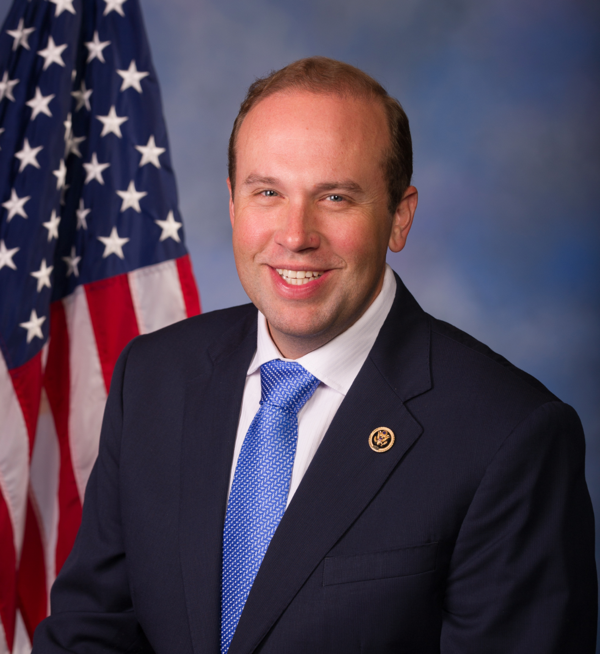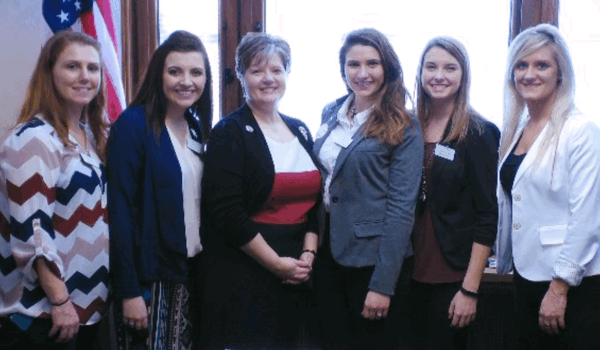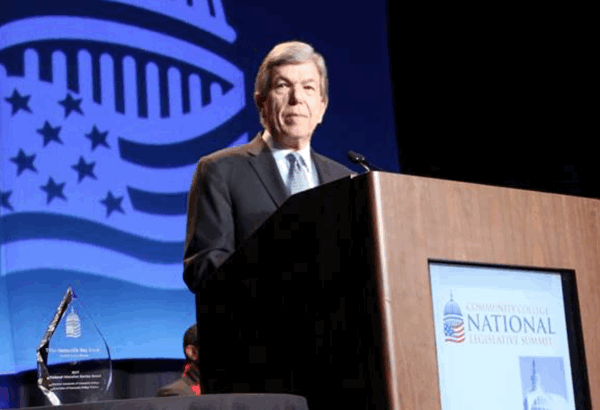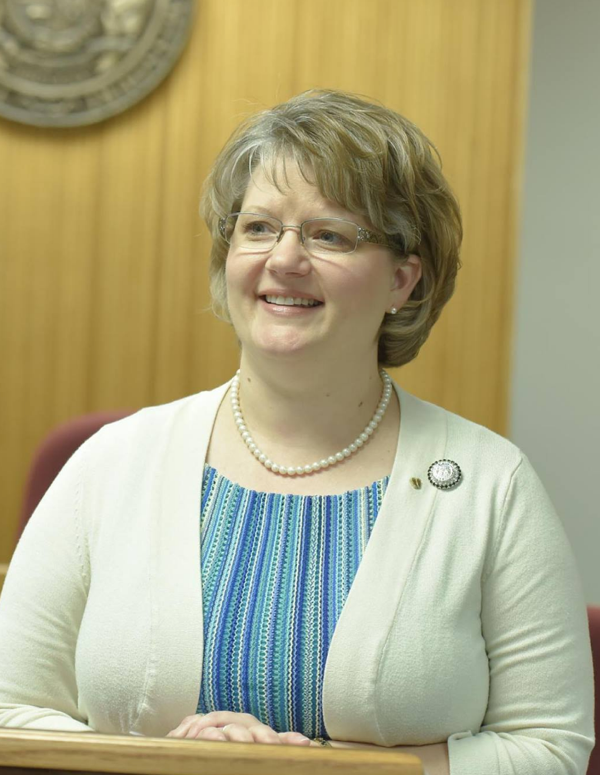
The Missouri House recently approved legislation meant to keep the state’s system of unemployment financially stable. The bill would link unemployment benefits to the rate of unemployment, and ensure the state keeps more money in the unemployment trust fund.
The bill is identical to legislation that was put into law in 2015. After being approved by the House and Senate, the bill was vetoed by Governor Jay Nixon. The House then took immediate action to override the governor’s veto. The Senate, which was at a standstill in the final days of session because of a filibuster, did not complete the override motion until the annual Veto Session in September. Because of the timing of the veto override motions, the Missouri Supreme Court later struck down the law.
The legislation approved this session by the House is meant to put the law back into effect. It is designed to make sure the state has enough money in its unemployment trust fund so that businesses don’t have to pay a penalty. Specifically, it will increase the minimum amount of money in the fund before employers’ contribution rates decrease. For example, Missouri businesses would see their contribution rates decrease by 12 percent if the fund has a balance greater than $870 million. Supporters note that Missouri is the only state that has been forced to borrow money from the federal government to pay for unemployment benefits during each of the last five economic downturns. As a result, employers have been forced to pay millions of dollars in interest.
The bill also ties unemployment benefits to the average unemployment rate so that more benefits are available when unemployment is high. If the state were in a position of high unemployment (9 percent or higher) benefits would be available for 20 weeks. In periods of low unemployment (lower than 6 percent) benefits would be available for 13 weeks. Supporters say the change is an important step toward ensuring Missouri can afford to help its citizens during times when they are without work.
Opponents say the change will make it even more difficult for unemployed Missourians to obtain the financial support they need to pay their bills and keep food on the table. They say it will make the length of Missouri’s unemployment benefits one of the shortest in the nation.
House Approves Legislation to Stop Illegal Use of Herbicides (HB 662)
The members of the Missouri House approved legislation that is meant to stop the illegal use of herbicides that have caused widespread damage to crops in the Southeast Missouri.
According to experts from the University of Missouri, many farmers in that region lost an average of 35 percent of their crops when neighboring farmers used an outdated Dicamba product. Wind and temperature changes caused that product to spread onto nearby fields. Because the product was drifting onto fields not planted with seeds resistant to it, those crops were damaged. At least 150 farmers were impacted by the illegal use of the product.
The legislation approved by the House would allow the Department of Agriculture to issue a fine to any individual who knowingly applies a herbicide to a crop for which the herbicide is not labeled for use. The department could issue a fine of up to $1,000 per acre on which a product is spread illegally. The per-acre fine would be doubled for those who repeatedly violate the new law. Under current law, the fine is a flat $1,000, which the sponsor of the bill said is not a strong enough deterrent. The money collected in fines would go to the local school district in which the violation occurred.
The bill would also give the Department of Agriculture additional powers to investigate claims of illegal uses. The department would be able to subpoena witnesses and compel the production of certain records related to the misuse of herbicides. Farmers penalized for illegal use would be liable to the department for its expenses and for personal property affected.
The bill includes an emergency clause, which would make it effective immediately upon being signed by the governor. The sponsor of the legislation told his colleagues, “If we do not raise the fine and the penalty for using illegal products, then we will have the same situation in 2017 that we had in 2016.”
Expanding Virtual School Options for Missouri Students (HB 138)
The Missouri House has approved legislation meant to expand course options and access for K-12 students. The bill would change the Missouri Virtual Instruction Program (MOVIP) to "The Missouri Course Access Program" (MCAP) and allows any K-12 student to enroll in MCAP courses.
The Missouri Virtual Instruction Program was established in 2007 to offer online courses to public, private, and home school students. The program allows students to take advanced courses that are not currently offered by their local school districts. As the sponsor of the legislation pointed out, there are 255 school districts in Missouri that have no students in calculus; 213 that have no students in physics, 105 that have none in chemistry; and there are 110 school districts that have ended their gifted programs.
In order to give students in all parts of the state access to advanced coursework, the legislation would allow students to take online courses that would be paid by the school district or charter school. Students would be eligible if they have attended the school for at least one semester, and the course is not available in the school district. The bill requires the Department of Elementary and Secondary Education to review the online courses to ensure they meet state standards.
The existing MOVIP has seen funding dwindle in recent years, which has limited free tuition to students who are unable to attend traditional schools because of health issues. The legislation that would change the program to MCAP would not rely on a direct appropriation, but would instead redirect a portion of the per-pupil funding provided by the state.
As the sponsor of the bill told his colleagues on the House floor, “Course access opens up possibilities for school districts. Course access makes education fair, equitable, and accessible.”
Missouri House Approves Perinatal Care Legislation (HB 58)
Members of the Missouri House gave bipartisan support this week to legislation meant to help reduce the incidence of preterm births and infant mortality in Missouri. The House approved legislation that would require the Department of Health and Senior Services to establish levels of neonatal and maternal care available at each birthing center in the state.
The bill is meant to provide a referral system that would ensure high risk and other at-risk newborns receive consultation and access to risk-appropriate care. In effect, it would ensure moms and babies receive the right care at the right place. Supporters note that approximately 25 percent of at-risk newborns in Missouri are born at a facility that is not equipped to meet their needs. They say enacting the legislation will allow complex care to be delivered in a more timely fashion to babies and mothers in need.
The House approved similar legislation during the 2016 legislative session, but the Senate failed to send the bill to the governor’s desk before time ran out.
Observing Missouri Memory Day
House members and visitors to the Capitol wore purple on Wednesday, Feb. 22 in honor of Missouri Memory Day. The annual event saw hundreds of advocates make their way to Jefferson City to educate elected officials about Alzheimer’s disease and the need to enhance access to care, support and services for people with dementia and their families.
According to the Alzheimer’s Association, Alzheimer’s is the most expensive disease in America. Right now, there are 5.4 million Americans with Alzheimer's. By 2050, the number of people age 65 and older with Alzheimer's disease may increase dramatically to a projected 13.8 million. Over the next 40 years, caring for people with Alzheimer’s will cost the United States $20 trillion, with nearly 60 percent of that borne by Medicare. Advocates say that the development of a treatment that delayed onset of Alzheimer’s by just five years would reduce Medicare spending on those with the disease by 45 percent in 2050.
House Members Recognize the Achievements of Eagle Scouts
House members took time this week to honor the hard work and success of Eagle Scouts from around the state. The young Scouts who achieved the rank of Eagle Scout during 2016 were on hand at the Capitol for Missouri Eagle Scout Recognition Day on Monday, Feb. 20.
Several of the scouts made their way to the House Chamber where they were recognized for reaching the highest achievement of any Scout. The Scouts also participated in a recognition program in the Capitol Rotunda that was highlighted by a keynote address from Missouri Secretary of State Jay Ashcroft, who is himself an Eagle Scout.
The Eagle Scout award is a performance-based achievement. To earn the Eagle Scout rank, which is the highest advancement rank in Scouting, a Boy Scout must fulfill requirements in the areas of leadership, service, and outdoor skills. Research has demonstrated the significant, positive impact Eagle Scouts have on society — from holding leadership positions in their workplaces and neighborhoods to voting and volunteering, and from protecting the environment to being prepared for emergencies.

In the days surrounding the President's formal address, the House of Representatives will simultaneously take up and advance legislation I have authored known as the Searching for and Cutting Regulations that are Unnecessarily Burdensome Act or SCRUB Act for short. This law would help compliment and codify much of the work President Trump has already taken in his first 30 days in office to reduce the impact unelected Washington bureaucrats are having on the lives of everyday Americans.
During his first full week in office, on January 30th President Trump authored Executive Order, "Reducing Regulation and Controlling Agency Regulatory Costs". Among other things, a key component of that order was a calling for the removal of two regulations for every new one proposed. The SCRUB Act sets up a commission of those directly impacted by Washington regulations to help the White House identify those regulations which should be removed - giving the President the tools to reduce regulations which are duplicative, burdensome and holding back innovation, entrepreneurism and growth in this country.
The facts we know are indisputable - regulations are costing the American economy close to $2 trillion, or $15,000 per household with farmers and small business owners across the country citing 'regulations' as a major impactor on their business and bottom line. We know that with bipartisan support the SCRUB Act passed the House of Representatives already last year. And finally, we know that if the liberal leader of the Senate, New York Senator Chuck Schumer, would simply let his Democrat colleagues vote their conscience, policies which reduce the headache Washington regulations are causing for millions of American families, like the SCRUB Act, would be on President Trump's desk before summer.
Unfortunately obstructing the progress and advancement of policies which shrink the size of Washington and get our economy moving again has been the playbook of the liberals in Washington since the day Donald Trump stepped into office. With an eye already to the 2020 elections, Senators like Elizabeth Warren have joined with Schumer to make this one of the slowest presidential cabinet confirmation processes in recent history. They have objected to common sense policies like the REINS Act which would require congressional approval for any regulation costing more than $100 million. Simply put, they are more interested in playing political games than in working with our newly elected President to change the course in Washington which millions of Americans supported, called for, and voted for this past November.
I am hopeful that after Tuesday night, those Washington insiders and Senators bent on obstruction will re-evaluate why their districts and states sent them to Washington. I am hopeful they will consider supporting the legislation, policies, laws, and nominations which will help alleviate the burden of an oversized federal government which taxes, regulates and spends too much. I know in the House of Representatives, with the passage of policies like the SCRUB Act, we are committed to giving President Trump the tools and resources he needs to enact the change in Washington that myself and millions of Americans have been overwhelmingly calling for.
This week, the United States House of Representatives will play host for President Trump's first formal address to the Joint Session of Congress. It is anticipated that the President will outline the many steps he and Congress will be taking in the coming months to help get millions of Americans back into the workforce. While investments in our nation's crumbling infrastructure will be discussed, along with a lowering of the crushing tax burden felt by families and farmers, some steps - like reducing the regulatory red tape stifling growth in this country - have already begun.
In the days surrounding the President's formal address, the House of Representatives will simultaneously take up and advance legislation I have authored known as the Searching for and Cutting Regulations that are Unnecessarily Burdensome Act or SCRUB Act for short. This law would help compliment and codify much of the work President Trump has already taken in his first 30 days in office to reduce the impact unelected Washington bureaucrats are having on the lives of everyday Americans.
During his first full week in office, on January 30th President Trump authored Executive Order, "Reducing Regulation and Controlling Agency Regulatory Costs". Among other things, a key component of that order was a calling for the removal of two regulations for every new one proposed. The SCRUB Act sets up a commission of those directly impacted by Washington regulations to help the White House identify those regulations which should be removed - giving the President the tools to reduce regulations which are duplicative, burdensome and holding back innovation, entrepreneurism and growth in this country.
The facts we know are indisputable - regulations are costing the American economy close to $2 trillion, or $15,000 per household with farmers and small business owners across the country citing 'regulations' as a major impactor on their business and bottom line. We know that with bipartisan support the SCRUB Act passed the House of Representatives already last year. And finally, we know that if the liberal leader of the Senate, New York Senator Chuck Schumer, would simply let his Democrat colleagues vote their conscience, policies which reduce the headache Washington regulations are causing for millions of American families, like the SCRUB Act, would be on President Trump's desk before summer.
Unfortunately obstructing the progress and advancement of policies which shrink the size of Washington and get our economy moving again has been the playbook of the liberals in Washington since the day Donald Trump stepped into office. With an eye already to the 2020 elections, Senators like Elizabeth Warren have joined with Schumer to make this one of the slowest presidential cabinet confirmation processes in recent history. They have objected to common sense policies like the REINS Act which would require congressional approval for any regulation costing more than $100 million. Simply put, they are more interested in playing political games than in working with our newly elected President to change the course in Washington which millions of Americans supported, called for, and voted for this past November.
I am hopeful that after Tuesday night, those Washington insiders and Senators bent on obstruction will re-evaluate why their districts and states sent them to Washington. I am hopeful they will consider supporting the legislation, policies, laws, and nominations which will help alleviate the burden of an oversized federal government which taxes, regulates and spends too much. I know in the House of Representatives, with the passage of policies like the SCRUB Act, we are committed to giving President Trump the tools and resources he needs to enact the change in Washington that myself and millions of Americans have been overwhelmingly calling for.
This week, the United States House of Representatives will play host for President Trump's first formal address to the Joint Session of Congress. It is anticipated that the President will outline the many steps he and Congress will be taking in the coming months to help get millions of Americans back into the workforce. While investments in our nation's crumbling infrastructure will be discussed, along with a lowering of the crushing tax burden felt by families and farmers, some steps - like reducing the regulatory red tape stifling growth in this country - have already begun.
In the days surrounding the President's formal address, the House of Representatives will simultaneously take up and advance legislation I have authored known as the Searching for and Cutting Regulations that are Unnecessarily Burdensome Act or SCRUB Act for short. This law would help compliment and codify much of the work President Trump has already taken in his first 30 days in office to reduce the impact unelected Washington bureaucrats are having on the lives of everyday Americans.
During his first full week in office, on January 30th President Trump authored Executive Order, "Reducing Regulation and Controlling Agency Regulatory Costs". Among other things, a key component of that order was a calling for the removal of two regulations for every new one proposed. The SCRUB Act sets up a commission of those directly impacted by Washington regulations to help the White House identify those regulations which should be removed - giving the President the tools to reduce regulations which are duplicative, burdensome and holding back innovation, entrepreneurism and growth in this country.
The facts we know are indisputable - regulations are costing the American economy close to $2 trillion, or $15,000 per household with farmers and small business owners across the country citing 'regulations' as a major impactor on their business and bottom line. We know that with bipartisan support the SCRUB Act passed the House of Representatives already last year. And finally, we know that if the liberal leader of the Senate, New York Senator Chuck Schumer, would simply let his Democrat colleagues vote their conscience, policies which reduce the headache Washington regulations are causing for millions of American families, like the SCRUB Act, would be on President Trump's desk before summer.
Unfortunately obstructing the progress and advancement of policies which shrink the size of Washington and get our economy moving again has been the playbook of the liberals in Washington since the day Donald Trump stepped into office. With an eye already to the 2020 elections, Senators like Elizabeth Warren have joined with Schumer to make this one of the slowest presidential cabinet confirmation processes in recent history. They have objected to common sense policies like the REINS Act which would require congressional approval for any regulation costing more than $100 million. Simply put, they are more interested in playing political games than in working with our newly elected President to change the course in Washington which millions of Americans supported, called for, and voted for this past November.
I am hopeful that after Tuesday night, those Washington insiders and Senators bent on obstruction will re-evaluate why their districts and states sent them to Washington. I am hopeful they will consider supporting the legislation, policies, laws, and nominations which will help alleviate the burden of an oversized federal government which taxes, regulates and spends too much. I know in the House of Representatives, with the passage of policies like the SCRUB Act, we are committed to giving President Trump the tools and resources he needs to enact the change in Washington that myself and millions of Americans have been overwhelmingly calling for.

Jefferson City, Missouri - On Wednesday, February 22, 2017 local students traveled to Jefferson City for an advocacy day for Occupational Therapists and students in that field.
"I was lucky enough to speak with these young ladies about their goals as therapists and how the legislature can support them," commented 151st State Representative Tila Hubrecht.
Pictured with Tila Hubrecht is Morgan Cliff of Dexter, Tiffany Wilcox of Advance, Erika Medlin of Scott City, and Jennifer Cook of Glen Allen.

Washington D.C. - U.S. Senator Roy Blunt (Mo.), Chairman of the Appropriations Subcommittee on Labor, Health and Human Services, Education and Related Agencies, recently received the National Education Service Award from the Association of Community Colleges Trustees and the American Association of Community Colleges. The award recognizes leaders for their efforts to support post-secondary education and training.
“As new jobs emerge in areas like advanced technology and health care, community colleges will continue playing a critical role in preparing students for the 21st century economy,” Blunt said. “That’s why I’ve been proud to lead efforts to make post-secondary education more affordable and accessible for Missouri students, including making Pell Grants available year round. I’m honored to receive this award, and will continue working to expand opportunity and make sure more students in our state and across the nation have the knowledge and skills they need to get ahead.”
As chairman of the appropriations subcommittee that funds the Department of Education, Blunt secured a provision in the bipartisan, committee-passed FY 2017 appropriations bill that would restore eligibility for year-round Pell Grants. This would allow full and part-time students to receive an additional Pell Grant during the year, helping them stay on track for graduation, enter or re-enter the workforce sooner, and graduate with less debt. Restoring year-round Pell would provide an estimated one million students, on average, an extra $1,650 to help pay for college.

Alexandria, Virginia - Rep. Tila Hubrecht, (R-Dexter) has been selected to serve in a leadership role for the National Foundation for Women Legislators, the nation’s oldest non-partisan organization addressing the needs of elected women at the city, county, and state levels of government.
Hubrecht, was recently appointed to serve on the 2017 Policy Committee for the National Foundation for Women Legislators (NFWL). Hubrecht was also appointed last month to serve as the 2017 Missouri NFWL State Director.
“I am excited to be appointed to this position and to have the opportunity to impact policy development and policy issues coming before legislators across the nation and working with individuals across our nation in shaping our nation’s future,” said Rep. Hubrecht.
As a member of the Policy Committee, Rep. Hubrecht will contribute to all committee business by developing educational programs on policy issues, engaging with policy partners, and recommending which areas of policy the Foundation shall focus on. The 2017 Policy Committee will focus on shared legislation by encouraging elected women to exchange legislative ideas. This is a new emphasis for NFWL and the Policy Committee will play an integral role in the launch and maintenance of shared legislation.
Elected women from across the country will gather in Minneapolis, Minnesota November 14-18, for NFWL’s Annual Conference to identify effective solutions to some of the nation’s most timely and pressing issues. Providing a non-partisan environment that encourages dialogue and the sharing of information and experiences, women leaders are able to build coalitions, share the concerns of their constituents, and identify out-of-the-box solutions to the most pressing issues facing their communities today.
“We are so honored Rep. Hubrecht has accepted a leadership position in our foundation,” shared Minnesota State Senator Carrie Ruud, NFWL’s 2017 Chair. “She will play a crucial role in the continued success of NFWL, as we embark on our most exciting year yet.”
Hubrecht, begins serving in her new position immediately and will hold this office through the end of 2017.
About the National Foundation for Women Legislators, Inc. (NFWL)
Through annual educational and networking events, the National Foundation for Women Legislators supports elected women from all levels of governance. As a non-profit, non-partisan organization, NFWL does not take ideological positions on public policy issues, but rather serves as a forum for women legislators to be empowered through information and experience. www.womenlegislators.org

